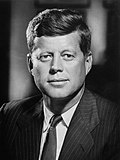| | |||||||||||||||||||||||||||||||||
| |||||||||||||||||||||||||||||||||
| |||||||||||||||||||||||||||||||||
| |||||||||||||||||||||||||||||||||
| Elections in Mississippi |
|---|
 |
The 1960 United States presidential election in Mississippi took place on November 8, 1960, as part of the 1960 United States presidential election. Voters chose eight representatives, or electors to the Electoral College, who voted for president and vice president. This was the last election in which Mississippi had eight electoral votes: the Great Migration of Black Americans caused the state to lose congressional districts for the third time in four censuses before the next election.
Contents
The election saw the only case of a state being carried by a slate of unpledged electors. Mississippi voted narrowly for this slate, who voted unanimously for long-time Virginia Senator and political machine director Harry Flood Byrd, over the national Democratic nominee, Senator John F. Kennedy of Massachusetts. Republican nominee and outgoing Vice President Richard Nixon, from California, came in third, with his percentage of the vote practically unchanged from what outgoing President Dwight D. Eisenhower recorded in 1956.
Governor Ross Barnett, a segregationist, was faced with a severe dilemma upon becoming governor at the beginning of the year owing to the rigid opposition of Mississippi’s limited and almost exclusively White electorate [1] to the active Civil Rights Movement. Pressured by the "Citizens' Council" who wished to unite the South behind a White-supremacist Democratic candidate, [2] Governor Barnett repeated James P. Coleman’s strategy from 1956 and nominated two sets of Democratic Party electors for the presidential ballot. [3] The first slate was pledged to Kennedy, while the other was not pledged to any candidate. The aim of placing unpledged electors on the ballot was to gain leverage from either major party in a close election, [3] with the possibility of the House of Representatives electing a candidate more favourable to opponents of Brown v. Board of Education than either national major party nominee. [4]
Because the civil rights movement’s supporters regarded Kennedy’s record as poor on this issue, Senators John C. Stennis and James Eastland supported his candidacy, although state-level politicians were not at all supportive. [5] The state’s media saw a vigorous debate between the loyalist and unpledged Democrats in the week before the election. [6] Outside heavily French-settled Hancock County, which has greater cultural ties with Louisiana than with most of the rest of Mississippi, Kennedy’s Catholic faith was also considered suspect. [7]
As of 2024, this marks the last time that the following counties voted Democratic: Choctaw, Harrison, Jones, Smith, and Warren.





